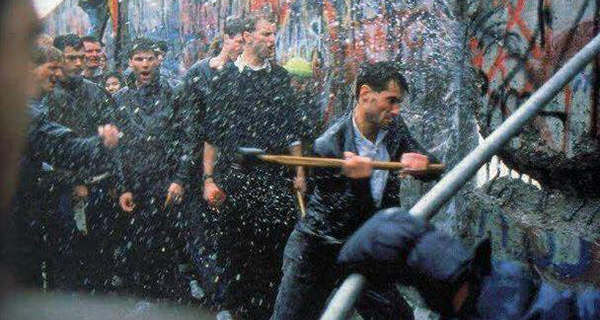 The most significant global event of my lifetime has been the fall of the Berlin Wall. It not only changed the geopolitical climate we live in, it also demonstrated the power of the human spirit.
The most significant global event of my lifetime has been the fall of the Berlin Wall. It not only changed the geopolitical climate we live in, it also demonstrated the power of the human spirit.
As a teacher, I often bring up this event.
German Chancellor Angela Merkel recently spoke to the graduates of Harvard University. We often forget that she looked at a wall every day as a young person in East Berlin. While the atmosphere was foreboding and there was no visible means of escape, nothing could control the thoughts of freedom in her mind or the minds of the people around her.
The global atmosphere was clouded by fear of our ultimate destruction but even that could not eliminate the truth of our oneness. This was particularly true for Germans, many of whom had family members living on the other side of the divide.
There are those who believe walls keep us safe but that’s an illusion. The world is full of once-invincible walls that today are obsolete. Build a wall and people will find a way to conquer it. Treat people with respect and dignity, and walls become unnecessary.
I lived behind a “security wall” when I was an aid worker in the Congo during a time of great economic and political instability. I noticed that when people wanted to get into our compound, they always found a way. Any security improvement was simply a temporary solution.
While the wall didn’t keep me safe, my congenial interactions with the Congolese people got me out of every difficult situation I encountered. Normally someone would speak up for me and if no witness was present, the long-established tradition of aid workers and missionaries being different from colonizers and business people virtually eliminated the threat of physical violence to my person.
During the first half of the 20th century, there were many barbed wire fences in Europe. We felt we had to protect ourselves from the ‘other.’ This resulted in tremendous suffering and genocide. Even after the Second World War ended, we continued to build walls.
Two things happened, however, to eventually bring Europe’s dark century to a triumphant end.
The first was the Marshall Plan. The United States pledged large amounts of money to rebuild Western Europe after the end of the Second World War. This allowed the continent to recover very quickly. West Germany, in particular, became a peaceful economic powerhouse. They were able to establish strong democratic traditions and become admired by much of the world, including their neighbours who had their freedoms and opportunities limited on the other side of the Iron Curtain.
The other source of progress in Europe was the establishment of the European Union. Borders within Western Europe gradually became obsolete. Countries that for centuries had invaded each other with hostile armies now had open frontiers. The result has been unprecedented prosperity for all.
Given these forces on the western side of the Iron Curtain, the walls that divided Germany and the rest of Europe could not withstand the pressure. In 1989, Angela, along with her family and friends, walked freely into West Berlin. In 2005, she became the first East German to lead a unified Germany.
Many walls remain in the world. There are physical walls and there are walls of racism, sexism and economic injustice. We also face walls created by the climate crisis, political turmoil and world hunger.
Yet when we look at how the world has changed since the middle of the 20th century, especially in Europe, Merkel’s closing words at Harvard don’t seem at all unrealistic: “We can do all of that.”
Walls have never been able to withstand the power of the human spirit.
Troy Media columnist Gerry Chidiac is an award-winning high school teacher specializing in languages, genocide studies and work with at-risk students.
The views, opinions and positions expressed by columnists and contributors are the author’s alone. They do not inherently or expressly reflect the views, opinions and/or positions of our publication.


